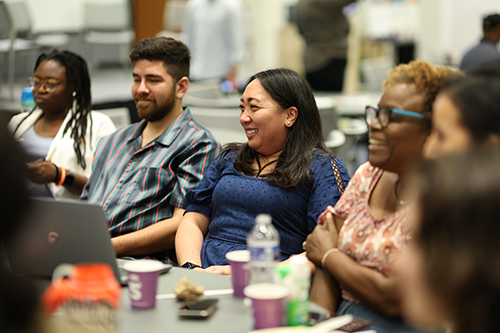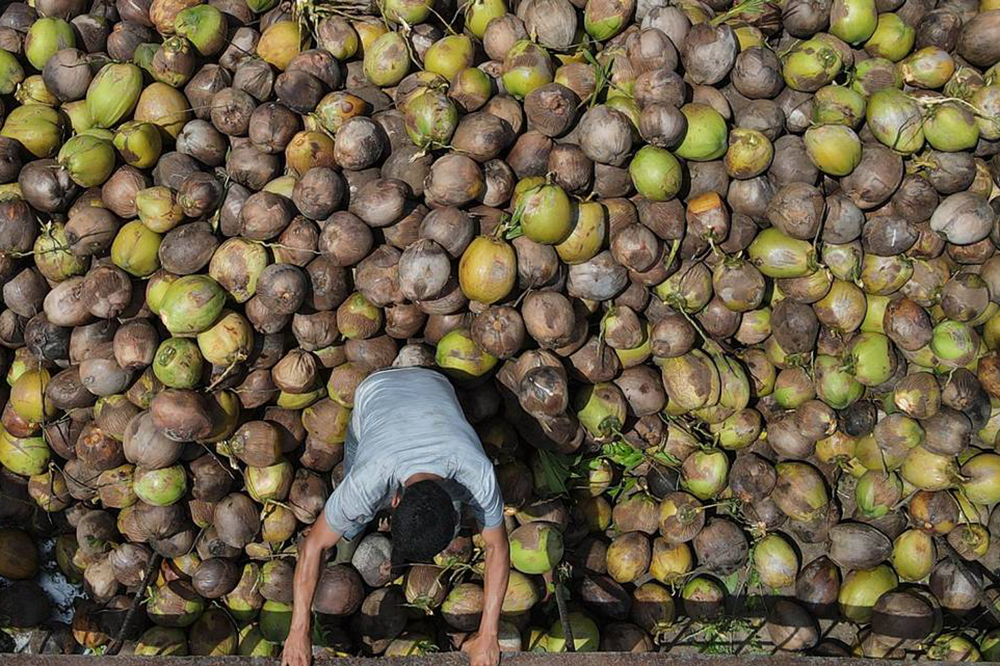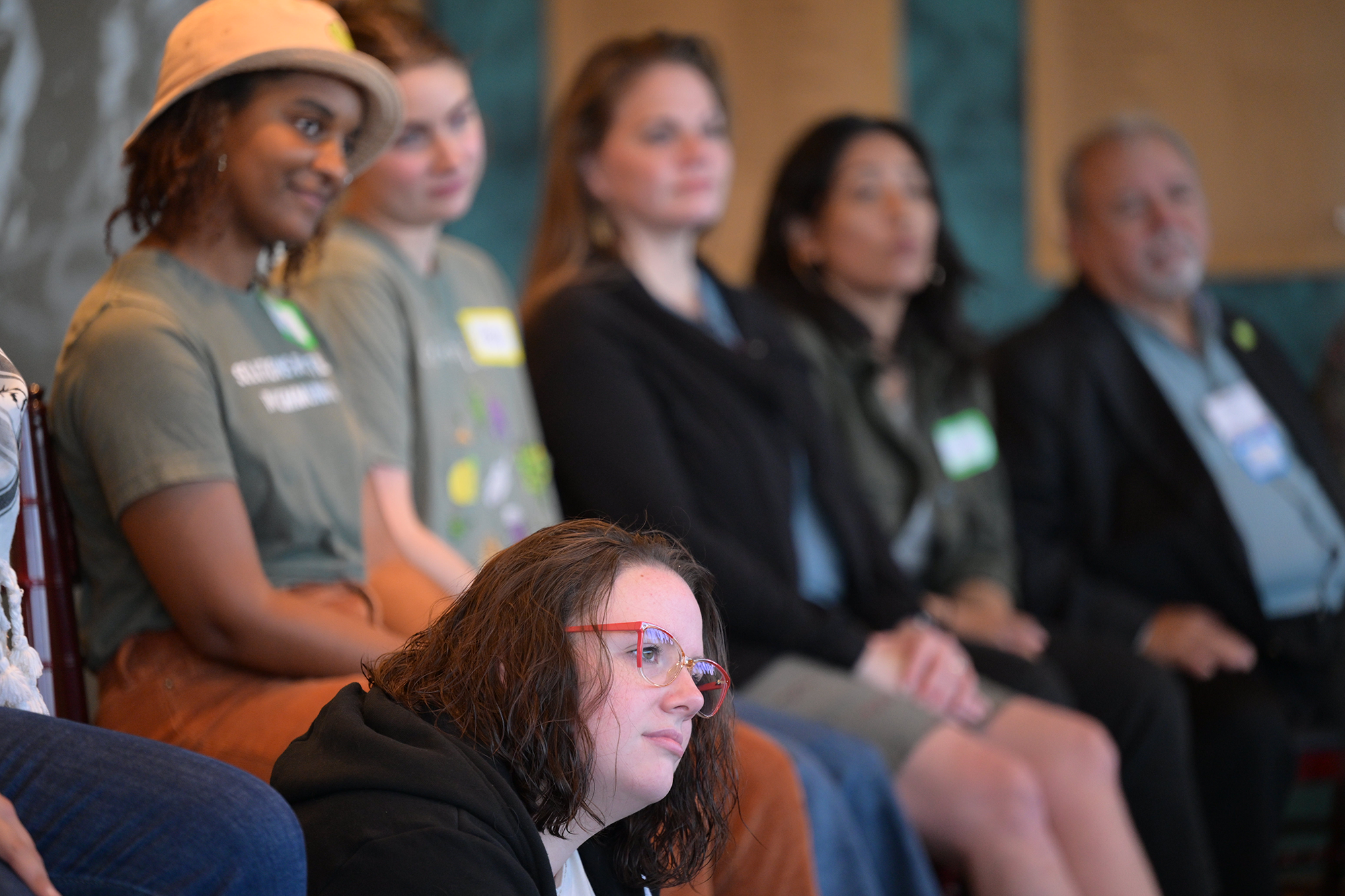
Along with many others, we here at NCBA CLUSA have been thinking about how to navigate the year ahead. We always start with our mission and vision. Our mission is what we do: develop, advance and protect cooperatives. Our vision is why we do it: to help more people use cooperatives to build a more inclusive economy. We are excited to work with our membership and partners to build on our collective successes to serve cooperatives in the new year.
To make sure we are serving the co-op community this year, we need to ask ourselves what it means to be a cooperative in 2024. As always, it means being an entity that adjusts and evolves to local, national and international conditions. In 2024, this means facing not only fiercely competitive market environments; it also means operating in a world confronting the generational challenges of climate change, deep inequality, tragic military conflict and a technology revolution.
These dynamics require cooperative leaders to be every bit as nimble and innovative as their non-co-op competition. But that does not mean that they need to act like non-co-ops. In fact, given our distinctive business model, it means that co-op leaders have an opportunity to lean into their cooperative identity to survive and thrive. Our shared values of self-help, self-responsibility, democracy, equality, equity and solidarity should inform how cooperatives navigate both the business and civic environments. For co-ops to thrive, they will need to advocate for a policy environment that supports cooperatives; they will need to be in a posture of continual learning; and they will need to embody the 6th Cooperative Principle of “cooperation among cooperatives.” In 2024, we pledge that NCBA CLUSA will be there for our members and the broader cooperative community to support you on this journey.
Members are at the center of our work, so we are growing several platforms to help members connect and drive the work of your apex cooperative association. With Co-op Circle, we have created a community of cooperators to share knowledge, inspiration and discuss key issues facing the cooperative community. With the launch of our Volunteer Councils, members and stakeholders have an opportunity to leverage volunteer leadership to drive the work of the association while building their networks and fueling their professional development.
Not a member of Co-op Circle yet? Sign up here!
Advancing the cooperative agenda
With members at the center of our work, we will advance the cooperative agenda through advocacy, development and thought leadership.
Advocacy In 2023, we stood shoulder-to-shoulder with the cooperative community, advocating for better policy and more resources to help people develop cooperatives and support existing cooperatives in their quest to serve members and communities. We brought back Hike the Hill during October’s Cooperative IMPACT Conference where cooperators fanned out across Capitol Hill to tell the co-op story, including by thanking the members of the Congressional Cooperative Business Caucus for their continued support. We worked with the U.S. Department of Agriculture, which hosted a series of cross agency cooperative events as part of the Interagency Cooperative Development Working Group. We cranked out nearly 40 advocacy action alerts and kept up a steady drumbeat on social media. We also worked with state and local governments to ensure they understood the important role that policy can have in supporting cooperatives.
In 2024, we will continue our work with Congress and the federal agencies, and we will also support cooperatives in this election year. Cooperatives should encourage their members to exercise their right to vote with efforts such as . We are excited to bring back the Cooperative Policy Roundtables in 2024 where we partner with cooperative associations on the ground to have in-person and hybrid events focused on informing our policy priorities and sharpening our advocacy strategies. In 2024, Cooperatives should also look for ways to engage candidates, such as inviting them to visit the co-op, hosting candidate forums, and otherwise communicating the cooperative’s policy priorities with the campaigns. NCBA CLUSA is here to help with advocacy materials, and we are always eager to help cooperatives and cooperative associations connect with elected officials and candidates.
Development A key aspect of our advocacy work is fighting for resources to support cooperative development, both within the U.S. and around the world. The center of the work is with the Rural Cooperative Development Grant program at USDA and the Cooperative Development Program at USAID. We are also working with the cooperative community to access co-op development dollars at other federal agencies, such as SBA (Small Business Administration), HUD (Housing and Urban Development), and the Department of Commerce.
As we kick off 2024, we are partnering with people in 23 projects and 17 countries across the world – including in the United States – to use the cooperative principles to build resilient communities, create economic opportunities and strengthen cooperatives. This means small farmers lead climate justice efforts, communities become more food secure, and economic development centers women, youth and marginalized people.
In 2024, we will expand this work to new projects and countries and double down in our efforts to partner with the cooperative development community here in the U.S. and beyond. We also plan to continue work with the Cooperative Development Foundation (CDF) to make a greater impact in the areas of affordable cooperative housing, home care worker cooperatives and food systems in Native Communities.
Thought leadership To tell the co-op story in the most effective way, we need to show people real examples and data that prove cooperatives are the right solution for today’s problems. In 2024, we will again host the Cooperative IMPACT Conference in Washington DC on October 2 and 3. We will continue to lift up emerging leaders in the U.S. and beyond by working with CDF on the expanded Cooperative Leaders and Scholars program, and we will be hosting cooperative leaders from across South and North America as Board of the International Cooperative Alliance of the Americas will be meeting in Washington DC that same week. And we will help celebrate the 50th anniversary of CDF’s Cooperative Hall of Fame by inducting four heroes of the cooperative movement.
Raising the Co-op Flag, Globally
One other exciting development for 2024 will be preparing for 2025 International Year of the Cooperative. In November of last year, the United Nations General Assembly proclaimed that 2025 would be the International Year of the Cooperative as a way of promoting co-ops and raising awareness of co-ops’ contribution to the implementation of Sustainable Development Goals and to overall social and economic development. The event provides an excellent opportunity for cooperatives in the United States and across the globe to show how cooperatives are building a more inclusive, sustainable and prosperous world.
Building Democracy and Positive Peace
Our work in 2024 must also tackle two of the great challenges of our time: the need to bolster democratic institutions and the necessity of building positive peace.
Nearly everyone predicts a tumultuous year in politics. And major elections aren’t confined to the U.S.—at least half the global population will go to the polls this year, often against a backdrop of extremism and autocracy.
With democracy as one of our shared cooperative values, co-ops have an opportunity to center democratic institutions in our society. Democracy doesn’t just mean open and fair elections; it also means free and open discussions. Cooperatives can serve as both short-term and long-term strategies for healthier democratic institutions. In the short-term, as Martin Lowery wrote in 2022, this democratic value involves a reciprocal relationship: the co-op needs a first-rate program of co-op education and engagement that includes all of the members, while the member needs to actively participate in their cooperative. In the long term, when co-op members practice healthy democratic habits in their co-op, they will become better practitioners and advocates for democracy in public institutions.
When co-op members practice healthy democratic habits in their co-op, they will become better practitioners and advocates for democracy in public institutions.
Sadly, 2024 begins with conflict as war rages in many parts of the world including in Ukraine, and in Palestine and Israel. The human tragedy caused by war has once again become all too apparent. As individual cooperatives, we can support the victims of war with direct contributions to entities like the United Nations Refugee Agency. As a cooperative community, we can also urge policymakers to address the root causes of war by leveraging cooperatives to build positive peace. By that, we mean more than merely the absence of violence. As the 2019 International Cooperative Alliance Declaration on Positive Peace through Cooperatives states:
“The cooperative movement, with its cooperatives, cooperators, support and representative organizations, beyond creeds and political traditions, has sustained since its origins its commitment to positive peace, as the goal and means to build a society founded on the values of democracy, equality, solidarity, participation and concern for the community. Conflicts derive from unmet human needs and aspirations, whereas cooperatives have the mission to respond to human needs and aspirations, including aspirations for a better future, more inclusive, more sustainable, more participative and more prosperous for all.”
By creating jobs and wealth that is rooted in the community, cooperatives are a preferred strategy for building positive peace. They can also be used to meet social needs such as affordable housing and healthcare, and they are incubators for teaching how to build democratic institutions through peaceful means.
As we navigate a new year, let’s recognize how cooperatives can truly help build a better world by building creating economic opportunity, bolstering democratic institutions, and building positive peace. In this context, NCBA CLUSA’s mission and vision has never been more relevant. We stand ready to support the cooperative community in our collective work to develop, defend and advance cooperatives—capturing their full potential.
—Doug O’Brien is president and CEO of NCBA CLUSA, where he works with the cooperative community to deepen its impact on the economy.


